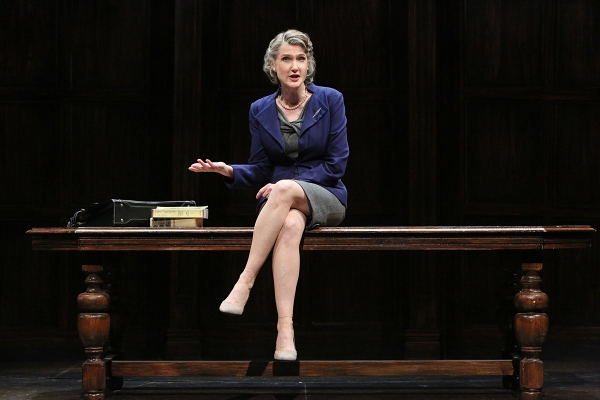Third
Annette O’Toole tackles the final leading lady in Wendy Wasserstein’s powerful portfolio.

(© Michal Daniel)
"Are you a Republican, Mr. Bull?" professor Laurie Jameson asks her freshman student, Woodson Bull III, whose knee-length shorts, collared pink button-up, and tan boat shoes seem to have already answered her question.
"Not particularly," he replies.
"Well, either you are or you aren't."
Political partisanship was still climbing to its current heights when Third — the final play of Wendy Wasserstein's abbreviated yet profound career — premiered off-Broadway at Lincoln Center in 2005. The play itself is set in 2002, exactly one year following the September 11th attacks that catalyzed the aggressive red-blue standoff that Americans, at this point, know all too well. In its original incarnation, Third took a microscope to the country's political and social fissures, and the insidious prejudices they came to reinforce. Nearly a decade later, Wasserstein's thoughtful insights have become an eerie time capsule, confronting us with the disheartening realization of how much our society — though continuously expanding in its liberal open-mindedness — has fallen further into dogmatic civil war.
Tony-nominated actor Michael Cumpsty directs a meticulous production at Red Bank, New Jersey's Two River Theater, drawing out the subtle nuances in Wasserstein's text that make her plays so enjoyable to dissect. In typical Wassersteinian fashion, a strong-willed female protagonist leads the charge as she takes on the complexities of middle age in the 21st century. She follows in the noble footsteps of Wasserstein's conflicted college students in Uncommon Women and Others and the pioneering single mother, Heidi Holland, in her Pulitzer Prize-winning Heidi Chronicles.
Annette O'Toole stars as 54-year-old Laurie Jameson — the first female professor to earn tenure at a prestigious liberal arts university in New England — who now embarks on the third, and potentially most terrifyingly indefinite portion of her life. She shares the woes of many middle aged women: two daughters transitioning into adulthood and an estranged husband who has become nothing but a series of loud thuds from his own midlife crisis-inspired weightlifting frenzy. Meanwhile, her aging father, Jack (played by the lovable J.R. Horne), is declining in health as her close friend and colleague Nancy Gordon (performed by the sharp-tongued Amy Hohn) simultaneously battles breast cancer.
As all of these personal crises swirl around her, the doggedly liberal scholar is blindsided by the most foreign of all beings: an upper-middle-class white male with conservative leanings and a varsity sweater. Woodson Bull III, or "Third" as he prefers to be called, introduces himself following Laurie's lecture on a feminist interpretation of Shakespeare's King Lear. Sermonizing from a dark wood-paneled hall, cleanly designed by Michael Carnahan with a tip of the hat to Harvard's dignified prestige, Laurie subverts her own aversion to simple categorization by flatly labeling King Lear's traditional heroine, Cordelia, as a "masochistic simp" — the first indication that the "hegemonic-free zone" she claims her classroom to be is anything but.
Christopher Sears, with his crisp speech and coiffed appearance, perfectly embodies the well-mannered wrestler, who has been groomed for high society at a well-to-do Connecticut prep school. This unassuming young man suddenly puts Laurie's militaristic "open-mindedness" to the truest test it has ever faced. Her immediate hostility toward Third and every aspect of the despised right-wing administration he represents to her eventually materializes in an unfounded accusation of plagiarism that unduly tarnishes his academic record in irreversible ways.
O'Toole is a steamroller as the brilliant yet single-minded Laurie, plodding through every hurdle — both actual and imagined — with the head-down fortitude that likely got her to the esteemed position she now holds in academia. Rather than leaving us with lingering doubts as to whose actions fall on the side of justice, O'Toole's thoroughly unlikeable portrayal of Laurie's witch hunt is clear from the start. O'Toole and Sears at times come across as one-dimensional cartoons of their respective demographics, a quality you would not expect from Wasserstein, whose characters are typically full-bodied and intricately layered. These layers, however, do eventually rise to the surface as Laurie and her personal enemy combatant shed their solid-blue and red shells (costume designer Karen Perry even has O'Toole open the play in a DNC-blue power suit).
Sears offers a glimpse into the politically ambiguous man beneath the elephant mask in a charming barroom scene he shares with Laurie's daughter Emily — the comically light-hearted yet fiery Emily Walton, who depicts her own quirky brand of confusion as a girl who has "never even known anyone who's slept with a Republican." O'Toole, meanwhile, in a poignant moment of self-realization, sheds a few pieces of Laurie's armor, exposing her underlying reasons for clinging so tightly to the ideologies that have kept her trapped, both personally and professionally.
Heavy on exposition and transparent in many of its metaphors, Third does not sneak up on you in the wonderful way many of Wasserstein's other works do. Still, the play offers plenty of timely morsels to pick apart, not to mention a few unavoidable mirrors that may expose some of our most unflattering tendencies — the rearview offering the most terrifying picture of all.










